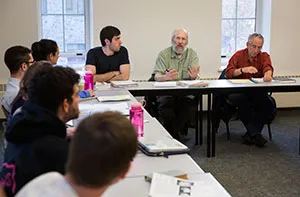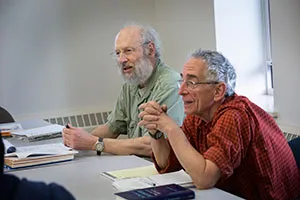Elevating Virtue

Taught by professors Barry Schwartz and Ken Sharpe for nearly 15 years, the popular Practical Wisdom course gives students the tools to solve ethical problems in the real world.
“Okay, okay, let’s take it easy now,” political scientist Ken Sharpe entreats the students sitting around a Trotter Hall roundtable on a drizzly spring night in mid-April, as their hands and their voices rise in unified tension. For more than two hours, they’ve been working steadily through a conversation about the practice of lawyering.
It’s the topic of tonight’s session of Practical Wisdom, the popular seminar that Sharpe and psychologist Barry Schwartz started nearly 15 years ago and are now teaching together for the last time. The participants are engaged in spirited debate, pondering the ramifications of lawyers picking certain clients and claims over others in order to advance a high-profile “cause” such as marriage equality. Is it practically wise to wait until the right client comes around, someone who can help to move the cause into the public eye? Even if the case is unlikely to win?
Most people who need legal support wouldn’t take that kind of risk, says Eve DiMagno ’15, a history major from Lincoln, Neb. Which means that lawyers must rely on a homogenous subset of the population to bring big cases forward — upstanding, white, middle-class Americans with less to lose. What does that tell us, then, about practicing “cause law”?
The stakes of this inquiry are palpable in the room. With each student Sharpe calls upon, new ideas bend the shape and direction of the conversation. Does the lawyer’s strategizing in this way deceive the public? Is the lawyer’s pragmatism, even toward a “common good,” ethically unwise?
Fingertips reach higher. Eyes meet and nod to one another in agreement or dissent. As one student’s words finish, her peers bubble forward with the fidgety sounds of a perfect piggyback claim or a necessary intervention, as they eagerly await the appropriate space to speak. Before Sharpe can even enter with a pushback to these questions, or Schwartz with a reality check about American public perception, the students of Practical Wisdom have pushed themselves to critically question whether a lawyer can even be both practical and wise.
Building Connections
The professors became fast friends at Swarthmore, says Schwartz, travelers of “the same intellectual landscape.” They shared concerns about liberal individualism as the dominant ethos of social science and social life and, based on Sharpe’s fluency with Aristotle, landed on wisdom and character as the key virtues of social institutions.
“People don’t talk about virtue and character," says Sharpe. “They’re there, but only in the background. Yet, these are the things we really count on to relate to one another.”

That thinking crystallized as the Practical Wisdom seminar, which aimed to help students discover imaginative solutions to the ethical challenges they will encounter in the workplace and in life. By starting with their own experiences of tackling small, common ethical choices, students learn what is needed to confront the ethical choices they will face for the rest of their lives and, more importantly, how to act upon this knowledge for their own good and the good of their communities. Think Aristotle meets positive psychology.
The professors imagined the paths their students would take post-Swarthmore: as life-long partners, colleagues, and parents and at work in fields such as education, medicine, and law among them. But the students didn’t have experience in those fields yet. The class needed a simpler hook.
“Our real stroke of insight was to start with a topic they’re already thinking they’re experts on: friendship,” says Schwartz. “It felt like it was something they could own. That gets them committed to the topic. That, then, gives them the conceptual tools to apply to things more mysterious to them.”
Once the ball is rolling, the professors integrate ethical theory and psychology, which the students connect to their own experiences. Inviting a student to share their experiences encourages a more general appreciation for the common experience, Sharpe says.
“Those bridges by which they make connections get them to larger principles or issues that ultimately reveal the need for character, virtue, and practical wisdom,” he says. “They do it, and we put a name on it, and they learn how to reflect upon it. That’s how we think about the course, really.”
This style requires the right mix of students, however. You need a few theorists to basically keep everyone honest, Schwartz says, but in a way that’s not too hostile, as well as a mix of life experiences and interests, concrete and abstract thinkers. But even then, a conversation with 22 students on a hot-button issue can devolve in a blink.
“How far into the ocean do you let students get before you throw them a life raft?” Schwartz says. “Ken can go too far, and I don’t go far enough. But he’s masterful at making them feel invited to share their thinking. The result has been a remarkable outpouring of thoughtful and often personal contributions every time we do the class.”
Planting a Seed
It’s very much a two-way exchange, however, from which both the students and professors benefit. By immersing themselves in material outside of their fields, Schwartz and Sharpe interact with — and, to their great surprise, are identified as — practitioners just as often as academics.

“We’ve carved out a field that doesn’t exist, in a way,” says Sharpe. “It’s taught me how to think about and teach issues that are recognized as important in any profession that takes service and knowledge seriously.”
It’s also given them a window into the mind of today’s college student, which Schwartz calls the most educational aspect.
“It’s different from how my own kids thought 20 years ago, how Swarthmore students thought 20 years ago, and I think it would be completely opaque to me if I were not teaching this course or something very much like it,” he says. “That transfers to the rest of what I teach, giving me a better sense of student expectations and what their aspirations are.”
With the spring semester concluded, the future of the course is up in the air, the professors say, due to Schwartz’s plan to retire after the Spring 2016 semester.
“I’d like to continue to teach it for the next few years,” says Sharpe, “but it’s not as much fun without Barry.”
Ideally, the principles at the heart of the seminar will be infused into more courses taught at Swarthmore, Sharpe says, and into the very approach faculty take to educating students.
“It’s not just about getting students analytically smart but getting them to practice problem solving and building collaborative relationships,” he says, “honing the communication and listening skills they’ll need to work well with others and live well themselves.”
Since many of the students will land positions of leadership and responsibility in an array of organizations, says Schwartz, “My hope is that they’ll appreciate the importance of being a mensch as they conduct their own lives and shape organizations, so that the people with whom they work have the opportunity also to be mensches.
“I see this as planting a seed that will slowly percolate," Schwartz adds, "and then influence the shape of all kinds of organizations as these people go forward.”
Barry Schwartz is the Dorwin P. Cartwright Professor of Social Theory and Social Action and author of The Paradox of Choice, which explores the devastating results of choice overload and paralysis in American society. Kenneth Sharpe is the William R. Kenan Jr. Professor of Political Science and author of Drug War Politics: The Price of Denial, which sheds light on the public health implications of American illegal drug policy. In 2010, they co-authored Practical Wisdom: The Right Way to Do the Right Thing, a culmination of Schwartz and Sharpe's long-time academic collaboration on the contemporary, everyday applications of Aristotelian practical wisdom.



